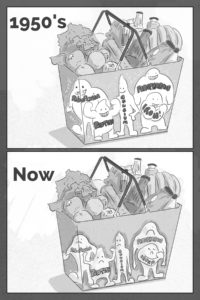 My family buys the fancy, half-dollar eggs with the complex label: GMO-free, soy-free, free-range, grass-fed, brown eggs at $6/carton.
My family buys the fancy, half-dollar eggs with the complex label: GMO-free, soy-free, free-range, grass-fed, brown eggs at $6/carton.
We spend four times what cheap eggs would cost to eat healthier. However, even our fancy eggs aren’t truly healthful. And most of the other 47,000 foods in an American supermarket are even worse.
Why?
Many consumers gave up. The diabetic scarfing his $2 double-bacon cheeseburger knows a pile of broccoli would be better for him. But, when he buys the broccoli, someone asks about butter . . . and salt . . . and whether he’s cooked the nutrients out. The more complex the nutritional details, the more appealing the escape into cheap comfort food.
Other consumers don’t know. Over a beer, the nutritionist I worked with at the Fortune 20 food ingredient company would tell us dozens of ways he could improve egg nutrition. In particular, we could improve egg biochemistry by designing the feed for an egg-laying chicken– our study of human reproduction gives us many clues about how to improve the nutrients in an egg. But, consumers don’t buy basis actual biochemistry– they buy based on a food’s label.
In fact, the food industry ignores all of the complex biochemistry that does not appear on a food label. And the consequences are clear. As we focus our advancing food technology on cost and appearance, our food is losing its nutritional value:
- Fruits and vegetables have less protein, calcium, iron, and riboflavin today than in 1950.
- A chicken today contains more than twice the fat,
a third more calories, and a third less protein than a 1940 chicken. - Even many organic foods are less nutritious than the traditionally farmed foods of the 1950s and 1960s.
In short, a communication problem lies at the heart of our unhealthful food. We currently cannot explain what is healthful on a food label completely and
I’ll send my insights into the tools and strategies
While I believe this labeling issue is central because it impacts how we discuss food, other issues are also important. What’s your answer? How can we get truly healthful food?
Our society cannot just survive. For the sake of our children, it must thrive.
This Saturday, 9:30 AM Eastern time, Lou Hutt Show on Sirius XM (here)
Money Talk with Melanie Podcast available now (here)
PS: When you’re ready, here are three ways you can grow your own profit while solving society’s big problems:
- Get insights, tools, and strategies for improving society—while benefiting yourself—in my book, Drowning in Potential: How American Society Can Survive Digital Technology.
- Hire me to speak at your next event. Hit reply and put “speaker info” in the subject line and I’ll send you my speaker information and a link to my demo reel.
- Explore how your business or organization can profitably solve society’s big problems through a customized one-half- to
three-day workshop. Just hit reply, put “workshop” in the subject line and I’ll send the workshop highlights.
And, if you have read even parts of my book, please help me by writing a review:
